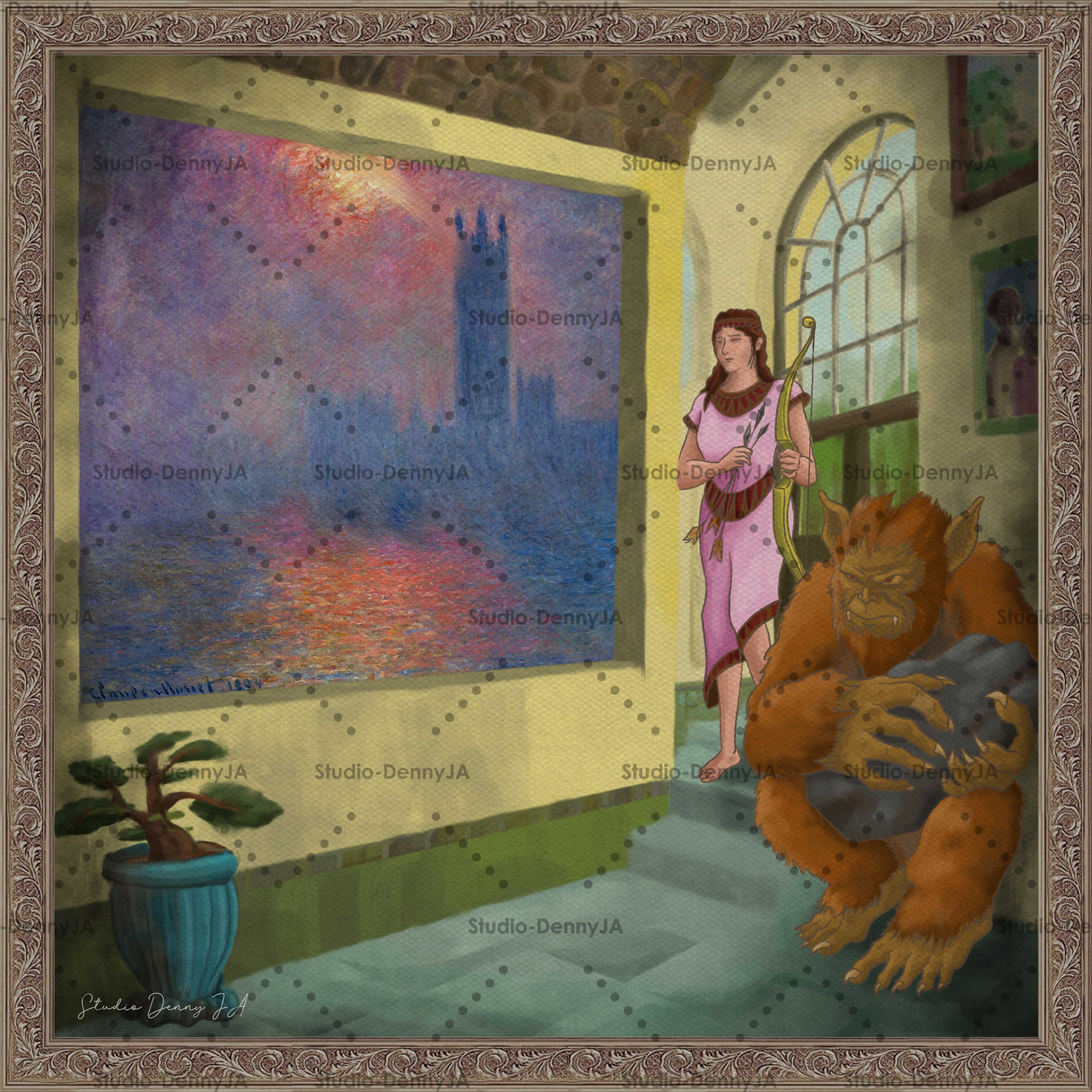Humbaba and Shamhat meets Claude Monet - Trouée de soleil dans le brouillard (1904)
Description
This painting is entitled Trouée de soleil dans le brouillard (Sun Breaking Through the Fog) Houses of Parliament by Oscar-Claude Monet in 1904. This painting is part of a series of paintings on the Houses of Parliament in England. In 1870 Monet fled to London, England because of the Franco-Prussian War[1] (1870 – 1871). Monet was very impressed with the beauty of the City of London, especially the fog that enveloped London as a result of the Industrial Revolution in England. Monet's fascination with the poetic City of London and the progress of the British nation that was developing due to the Industrial Revolution, made Monet promise that one day he would return to visit London again. In 1899 – 1905 Monet had the opportunity to return to London, in this year he made the famous British Houses of Parliament Series, where this impressionist style painting includes 19 series of paintings.
[1] The Franco-Prussian War was one of the most historic war events in Europe, France's response to Chancellor Otto von Bismarck's plan to unify Germany into one nation. Prior to 1870, the German nation was a nation that was broken up into smaller kingdoms such as Austria, Bohemia, Bavaria, Augsburg, Aachen, Dortmund, Magdeburg, Mainz, and many other Germanic-speaking and culturally-speaking countries in a confederated empire called the Throne. Holy Roman Empire (Holy Roman Empire). The Holy Roman Empirewas founded by Emperor Charlemagne or also known as Carolus Magnus (Charles The Great) on December 25, 800, Emperor Charlemagne considered himself the rightful heir of the Roman Empire.
Unlike any empire in general, this empire is not a hereditary institution because the Emperor of the Holy Roman Empireis elected by an institution called the Elector which consists of representatives of various countries that are members of the Holy Roman See. Princes or Kings who are members of the Holy Roman Empire, can nominate themselves to be Emperor of the Holy Roman Empire and later this Elector will choose the Emperor who is considered worthy to lead them.
Unlike any usual state which had complete sovereignty over its territory, the Holy Roman Empire was often considered an imaginary state because of its confederal nature. The members of the Holy Roman Empire, consisting of Princely States or Kingdoms such as Spain (at one time Spain was a member of the Holy Roman Empire), each of whose members had complete sovereignty over their own territory and the emperor had no authority over their internal affairs and as well as their foreign policy. The emperor was only considered a symbol of the unification of the entire German nation and could only issue a policy, known as the Imperial Diet in which every royal leader who was a member of the Holy Roman Empire gathered with the Emperor of the Holy Roman Empire to deliberate to issue a common policy for the empire. The decision which was then, from a meeting called the Imperial Diet was then mandatory for all kingdoms that joined the Holy Roman Empire. This empire reached its peak during the reign of King Carlos II of Spain, but slowly the power of this empire declined due to the emergence of the Protestant Reformation which gave birth to the teachings of Lutheranism and Calvinism. Finally, there was a religious war between Catholics and Protestants known as the Thirty Years' War.
The war ended after the Catholics and Protestants made peace, finally the Emperor of the Holy Roman Empire began to recognize Protestantism both Lutheran and Calvinist as one of the official religions of the empire along with Catholicism. This war weakened the empire, slowly the empire's territory reduced. It was not until 1806 that the Holy Roman Empire was dissolved due to the Napoleonic Wars and much of its territory was under French control. Finally, many countries that were former territories of the Holy Roman Empire, were divided into 39 countries, all of which were Germans, from these 39 countries emerged the 2 strongest countries, namely the Kingdom of Prussia and the Kingdom of Austria. The Chancellor of Prussia, Otto von Bismarck started a movement to unite all German peoples under Prussian domination, almost all German nations accepted except the Austrian Empire which was Prussia's strongest rival.
Emperor Napoleon III saw Bismarck's move threaten his rule, moreover Bismarck also planned to take the Austrian Empire under Prussia. If this step is allowed, then the united German nation will become a fierce rival of France. France declared war on Prussia in 1870, this act angered the Germans who were trying to unite. Then they united to attack France, finally France lost in 1871. The Second French Empire dissolved, the Alsace-Lorraine region was taken from France and a republican government was established in France. The Palace of Versailles, Paris was occupied by Prussian troops and Otto von Bismarck proclaimed the unification of the German people under the Prussian Empire, German representatives from 37 states also raised their swords when the proclamation was read and they pledged allegiance to Otto von Bismarck and Emperor Wilhem I of Prussia. For the first time the Germans were united in a state in the 19th century. Although Bismarck's efforts to unite Austria were unsuccessful, Austria instead formed the Austro-Hungarian Empire, for the first time the world recognized the existence of a German nation that we know today.

